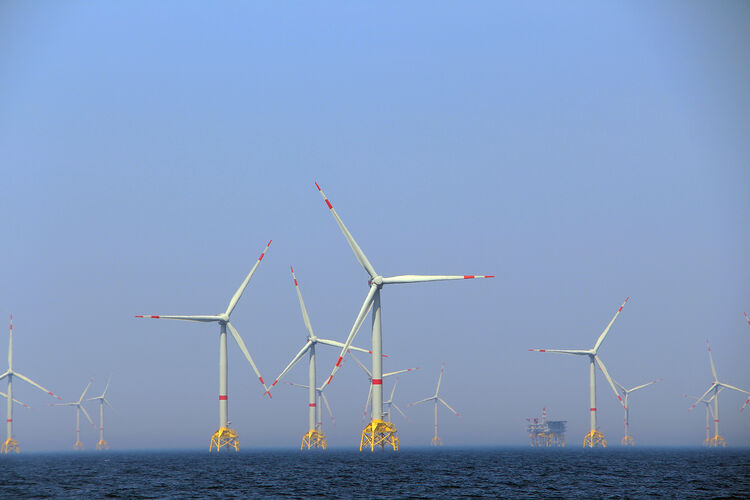Bremerhaven, 10 June 2020: WAB welcomes the fact that the Federal Government recognizes in its National Hydrogen Strategy (NWS) that only "green" hydrogen is sustainable in the long term and emphasizes the special role of wind energy at sea and on land in its strategy. In its NWS, the Federal Government identifies further goals worthy of support, but which can hardly or only insufficiently be achieved with the proposed measures.
The German government is well advised to expect a "significant increase" in demand for hydrogen in the medium to long term in its NWS and to emphasise that a strong domestic market is indispensable for the hydrogen supply chain and its export opportunities. "Green" hydrogen is a CO2-reducing solution and is urgently needed for sector coupling.
With its target of covering only one seventh of the expected domestic demand by 2030 with “green” hydrogen, the German government is not living up to this claim. The intention to build up an electrolysis capacity of 5 GW by 2030 and another 5 GW by 2040 at the latest must be accompanied by the necessary economic efficiency to enable a domestic market in the medium term. In order to achieve the energy and climate policy objectives of the Federal Government - in particular the “sector objectives” until 2030 - accompanying measures are necessary in addition to CO2 pricing.
"We welcome the fact that incentives are to be created for the market ramp-up of hydrogen technologies in Germany," said WAB managing director Heike Winkler. "In the sine qua non of the European Green Deal, there is no alternative to European cooperation - especially with the countries bordering the North Sea", she added. However, the German government should focus more consistently on the potential of the domestic market for climate-friendly "green" hydrogen, supplemented by an import strategy. In this way, it could better combine climate protection with jobs and value creation - for the wind industry, the maritime economy and the growing hydrogen economy.
The triangle of objectives of the national climate plan, which was also adopted today, consisting of sustainability, climate protection and security of supply, must be expanded to include the industrial policy dimension. Only in this way the economic potential of the energy system transformation can be fully exploited. With its NWS, however, the German government is relying on hydrogen imports on a large scale without exploiting the potential of its own generation market.
A strong focus on research into the hydrogen supply chain will remain inefficient without an ambitious development of the domestic market. Research and development alone will not lead to the "global leadership role" in hydrogen technology for Germany in what is already a highly competitive international market. "Innovation Officers" for hydrogen should therefore be rather linked to the Federal Ministry of Economics and Technology than to the Federal Research Ministry. "The know-how for a sustainable hydrogen economy and the strongest export player will be created where ambitions are high and the framework conditions are favourable", said Heike Winkler.
It is therefore not very consistent if the Federal Government, in order to improve the framework conditions for hydrogen production, merely aims to exempt the production of green hydrogen from the EEG surcharge. "A promised examination of whether electricity used for the production of green hydrogen can be exempted from taxes, levies and levies is not enough", said the WAB managing director.
"It is a positive sign that after months of delay, the federal government has finally agreed on a national hydrogen strategy and long-term goals for the expansion of offshore wind energy," said WAB CEO Irina Lucke. "We welcome the fact that the federal government has agreed on a flexible target for the expansion of offshore wind by 2030 and expect the rapid planning and tendering of additional generation capacities on- and offshore to meet the rapidly growing demand for 'green' hydrogen," she added.
The industry is ready for “green” hydrogen! We look forward to the dialogue with the German government and the Northern states to implement the additional generation capacities required for electrolysis.
About WAB e.V.:
Bremerhaven-based WAB is the nationwide contact partner for the offshore wind industry in Germany and the leading business network for onshore wind energy in the north-west region. The association fosters the production of “green” hydrogen from wind energy. It comprises some 250 smaller and larger businesses as well as institutes from all sectors of the wind industry, the maritime industry as well as research.
WAB e.V. organises the international WINDFORCE Conference in Bremerhaven, this year postponed to 3 and 4 September. The WINDFORCE Conference has become the central meeting place for the offshore wind industry in Germany during its 15-year history. The WINDFORCE Dinner will offer participants the opportunity to enjoy the company of existing and new business partners in a pleasant atmosphere.
Contact:
Hans-Dieter Sohn | Senior Communications and Marketing Manager WAB e.V. | +49 173 2382802 | hans.sohn@wab.net
Picture: (c) WAB
